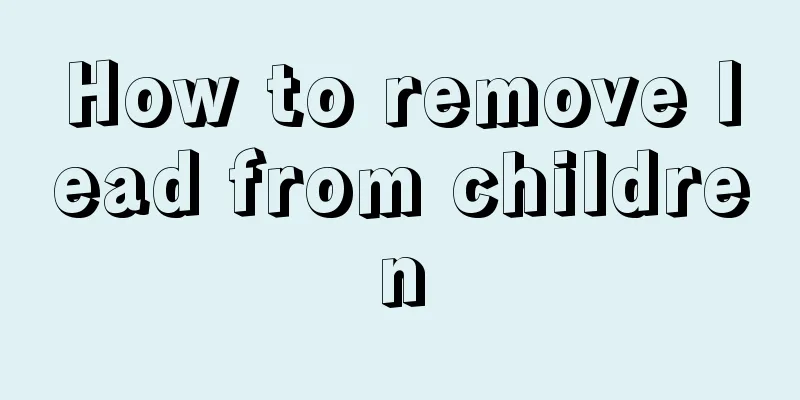What are the dangers of a newborn choking on water?

|
Since many organs of newborns are not fully developed, they are very easy to choke on milk or water. Therefore, parents must be careful when feeding their babies water or milk. However, if the baby chokes on water, it is generally not a big problem, but it may cause aspiration pneumonia. Therefore, after feeding the baby water, be sure to hold the baby upright and pat the baby gently. The biggest danger of a baby choking on milk is that it will cause oxygen deprivation to the baby's brain, leading to the baby's death. Babies' nervous systems are just developing and some of their reflexes are still weak, so they cannot cough out milk that gets into their respiratory tract. As a result, suffocation often occurs due to mechanical obstruction of the airway by milk. At the same time, the baby's brain cells are very sensitive to oxygen and will die if the oxygen supply is stopped for 5 minutes. Therefore, choking on milk may very likely lead to the tragedy of sudden infant death. In fact, when a baby chokes on milk, the color of his skin and complexion will change in severe cases, and at this time many mothers will start to panic. Therefore, for the baby's health, mothers should pay more attention to details when feeding the baby to reduce the chance of choking. In fact, many times, babies choke on milk very suddenly, and emergency first aid is necessary when choking occurs, otherwise the baby is likely to die from brain hypoxia within a short period of time. Therefore, after mastering the first aid measures for babies choking on milk, mothers and fathers also need to pay attention to preventing babies from choking on milk in daily life. Because eliminating the hidden dangers first is the best protection for the baby. 1. Feed at the right time: Do not feed the baby when he is crying or laughing, and do not wait until the baby is very hungry to feed him. The baby may choke if he eats too fast. Do not force the baby to feed after he is full. Force-feeding can easily cause accidents. 2. Correct posture: Breastfed babies should lie diagonally in the mother's arms (upper body at 30-45 degrees), and should not be fed while lying on the bed. When bottle-feeding, the baby should not lie flat. Instead, he should lie in an inclined position with the bottom of the bottle higher than the nipple to prevent him from inhaling air. 3. Control the speed: When the mother secretes milk too quickly and the amount of milk is too much, use your fingers to gently press the areola to slow down the flow of milk. The hole of the nipple for artificial feeding should not be too large, and the milk should flow out in drops rather than in a line when turned upside down. 4. Pay attention to observation: The mother’s breast should not block the baby’s nostrils, and the mother must observe the baby’s facial expression while feeding. If milk overflows from the corners of the baby's mouth or the area around the mouth and nose turns blue, stop feeding immediately. Infants who have experienced choking or premature babies should be closely observed or asked to ask a doctor for feeding guidance. 5. Expel gas from the stomach: After feeding, hold the baby upright on your shoulders and pat the baby's back to help expel gas from the stomach. It is best to hear the baby burp before putting the baby back to bed. |
<<: What changes will happen to a newborn baby after one month?
>>: Are Urinary Tract Infections in Newborns Serious?
Recommend
How to care for 8-month-old baby with cold and stuffy nose
The baby's immunity is relatively weak, and c...
Why does a three-month-old baby have tears in his eyes?
The eyes of newborns are most vulnerable to exter...
What to do if your child has a persistent high fever
High fever is a particularly dangerous symptom fo...
What is the cause of low body temperature in children?
Children are the hope of every family. Every fami...
What to do if your child has difficulty defecating
We all know that the baby's physical health i...
What is ringworm on baby's face?
Many babies have ringworm on their faces, which o...
What should I do if my child has lung heat and cough?
Many children usually have some coughing. There a...
Why does my child keep blinking?
In life, there are many reasons why children blin...
Baby's head with red envelope
If a red bump suddenly appears on your baby's...
What should I do if my child is picky about food and refuses to eat vegetables?
Most children are picky eaters, which is a headac...
Causes of mild cerebral palsy in children
Cerebral palsy is not unfamiliar to everyone, so ...
How many times a day is normal for a baby to poop?
The birth of a baby brings joy to countless famil...
1 year old baby diarrhea
Diarrhea is a very common symptom. For adults, se...
What to do if your child has a lot of earwax
Earwax is a yellow liquid. Some people have drier...
Can babies eat yogurt when they are one year old?
Yogurt is delicious and can increase people's...









